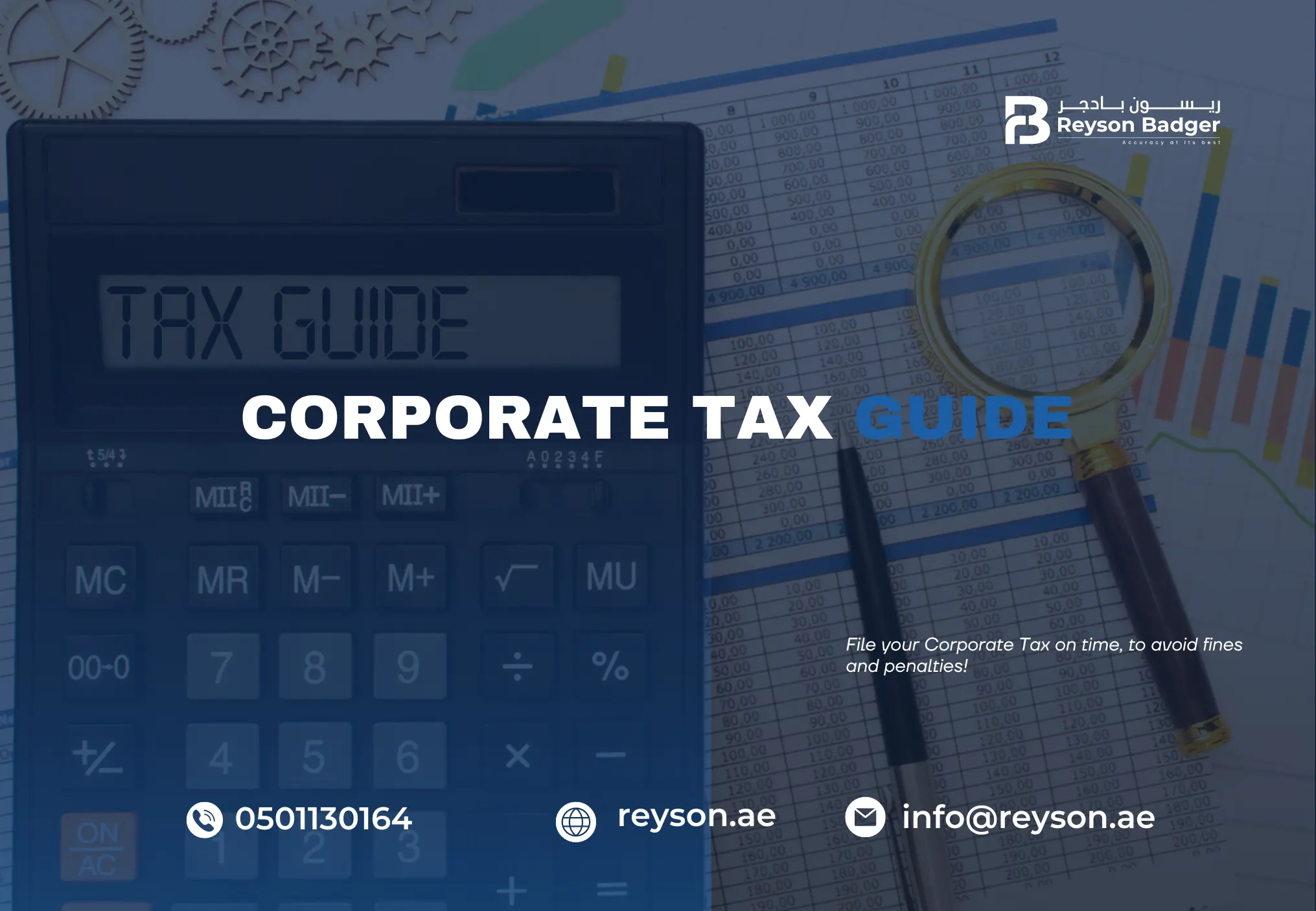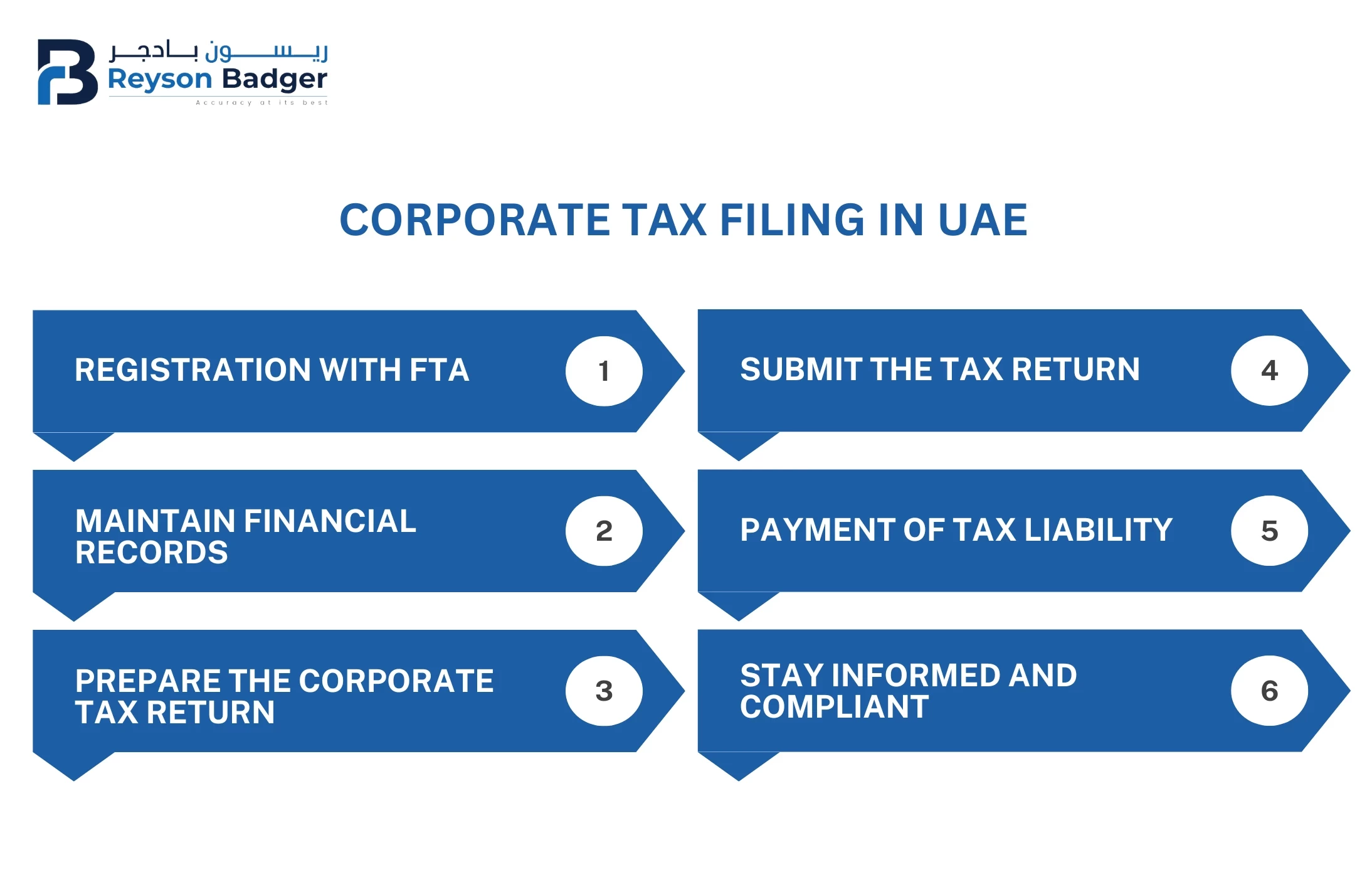Corporate Tax in UAE
The United Arab Emirates (UAE) implemented a federal Corporate Tax (CT) system in June 2023. This new regime aims to diversify the country's revenue streams and position it as a more competitive global business hub. This guide will provide you with a comprehensive overview of the key aspects of UAE Corporate Tax.

Objectives of Corporate Tax
The UAE introduced corporate tax to:
- Strengthen its position as a global business hub.
- Support economic growth and strategic transformation.
- Ensure compliance with international tax transparency standards.
- Prevent harmful tax practices and promote fair competition.
Who is Subject to UAE Corporate Tax?
The CT applies to most businesses and commercial activities conducted within the UAE, with a few exceptions. Here's a breakdown of who is subject to the tax:
1. Companies & Legal Entities Required to Pay Corporate Tax
a) UAE-Based Companies
- Mainland Companies: All businesses registered in the UAE (except exempt entities).
- Free Zone Companies:
b) Foreign Companies with UAE Presence
- Businesses with a Permanent Establishment (PE) in the UAE (e.g., branch offices, physical offices).
- Companies earning UAE-sourced income (e.g., from real estate, services, or contracts performed in the UAE).
c) Tax Groups
- Companies under 75% common ownership can form a tax group and file a consolidated return.
2. Individuals Subject to Corporate Tax
- Self-employed professionals & freelancers (if annual business income exceeds AED 375,000).
- Sole proprietorships & individual business owners engaged in commercial activities.
3. Exempt Entities (Do Not Pay Corporate Tax)
The following are generally exempt from UAE corporate tax:
- Government & semi-government entities
- Public benefit organizations & charities (approved by the FTA)
- Pension & social security funds
- Qualifying investment funds
- Extractive businesses (oil & gas, subject to emirate-level taxes)
- Non-resident businesses with no UAE-sourced income or PE
4. Special Cases & Conditions
a) Free Zone Businesses (0% Tax Under Conditions)
To benefit from 0% CT, a free zone company must:
- Conduct qualifying activities (e.g., manufacturing, trading, logistics).
- Maintain adequate substance in the UAE (office, employees, operations).
- Not earn mainland UAE-sourced income (unless permitted).
- Comply with transfer pricing and anti-abuse rules.
b) Non-Resident Businesses (Only Taxed on UAE Income)
Foreign companies without a UAE presence are only taxed on:
- Income from a UAE Permanent Establishment (PE).
- UAE-sourced income (e.g., real estate, service contracts).
Key Features of UAE CT
Tax Rate
The UAE CT features a tiered system with the following rates:
- 0%: Applicable to taxable income not exceeding AED 375,000 (approx. USD 102,100). This offers relief to small businesses.
- 9%: Standard rate applicable to taxable income exceeding AED 375,000.
- 15%: Applies to large Multinational Enterprises (MNEs) meeting specific criteria related to group revenue.
Important Considerations
- Small Business Relief: Businesses with taxable income below AED 375,000 qualify for a 0% tax rate.
- Free Zone Companies: The CT treatment for free zone companies depends on their specific free zone and the type of income earned. Qualifying free zone persons earning qualifying income are generally exempt from CT. However, non-qualifying income earned by them is subject to the 9% tax rate.
- Qualifying Free Zone Person: A Qualifying Free Zone Person (QFZP) is a Free Zone Person that meets specific criteria, such as deriving Qualifying Income, maintaining adequate substance in the Free Zone, and not electing to be subject to the standard Corporate Tax rules and rates. The Free Zone Person must also comply with the arm’s length principle, maintain appropriate Transfer Pricing documentation, and audited Financial Statements
- Qualifying Income: Qualifying Income is income derived by a Qualifying Free Zone Person (QFZP) that is eligible for a 0% Corporate Tax rate under specific conditions. This includes income from transactions with other Free Zone Persons who are the Beneficial Recipients, transactions related to Qualifying Activities, income from Qualifying Intellectual Property, and other income, provided the QFZP meets the de minimis requirements.
- Transfer Pricing: UAE CT Law incorporates transfer pricing rules, which aim to ensure transactions between related parties are conducted at arm's length (fair market value).
- Double Taxation Agreements: The UAE has existing Double Taxation Agreements (DTAs) with many countries. These DTAs help avoid double taxation on the same income earned in both countries.
According to Decision No. 3 of 2024 from the Federal Tax Authority, starting from March 1, 2024, the FTA has set forth deadlines for all businesses and taxable individuals to enroll. This enrollment pertains to all businesses (legal entities) possessing a trade license. The deadlines are staggered to allow the FTA enough time to properly evaluate applicants.
Regardless of the year of issuance of the license, the date of license issuance is taken into consideration.
Here are the deadlines for submitting a Tax Registration application:
| License Issuance Period |
Deadline for Tax Registration Application |
| January 1 - January 31 |
May 31, 2024 |
| February 1 - February 28/29 |
May 31, 2024 |
| March 1 - March 31 |
June 30, 2024 |
| April 1 - April 30 |
June 30, 2024 |
| May 1 - May 31 |
July 31, 2024 |
| June 1 - June 30 |
August 31, 2024 |
| July 1 - July 31 |
September 30, 2024 |
| August 1 - August 31 |
October 31, 2024 |
| September 1 - September 30 |
October 31, 2024 |
| October 1 - October 31 |
November 30, 2024 |
| November 1 - November 30 |
November 30, 2024 |
| December 1 - December 31 |
December 31, 2024 |
| A Juridical Person without a license |
3 Months from March 1, 2024 |
Businesses failing to submit their Corporate Tax registration applications within the specified timelines will face an administrative penalty of AED 10,000 for late registration.
Steps to Corporate Tax Filing in UAE
Filing Corporate Tax in the UAE is a structured and straightforward process designed to ensure compliance with Federal Decree-Law No. 47 of 2022. Here’s how businesses can file their Corporate Tax returns:

Step 1: Registration with FTA
Step 2: Maintain Financial Records
- Maintain accurate financial records and compute taxable income.
- Identify eligible deductions, exemptions, and reliefs (e.g., small business relief, group transfers).
Step 3: Prepare the Corporate Tax Return
- Calculate your taxable income by adjusting your accounting profit for any exemptions, reliefs, or deductions as specified by the UAE Corporate Tax Law.
- The UAE imposes a 0% tax rate on taxable income up to AED 375,000 and a 9% rate on taxable income exceeding this threshold.
Step 4: Submit the Tax Return
- Submit your corporate tax return electronically through the EmaraTax portal within 9 months of the financial year’s end.
- The UAE requires that all corporate tax returns be filed online via the EmaraTax portal. The system is dynamic, presenting tailored questions and schedules based on the taxpayer's specific circumstances.
Step 5: Payment of Tax Liability
- Determine your tax liability based on the applicable rates and ensure payment is made by the specified deadline to avoid penalties.
Step 6: Stay Informed and Compliant
- Regularly consult the FTA's official communications and guidelines to stay updated on any changes in tax laws or filing procedures.
- Consider seeking advice from tax professionals to ensure full compliance and to address any complexities specific to your business operations.
Corporate Tax in Dubai
The UAE's corporate tax rules are new and evolving, so it's smart to have a well-thought-out plan from the start. This will make it easier to adjust to any future changes. Since the tax landscape is constantly shifting, it's important to regularly review your strategy and get advice from UAE tax experts. By being proactive and staying informed, your business can handle the complexities of UAE corporate taxes.

